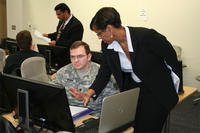Due to more than anticipated demand for a popular government assistance program for career-minded military spouses, Department of Labor and Pentagon officials have expanded the Military Spouse Career Advancement Account pilot program to better meet the needs of a wider range of job seekers.
Now spouses of service members in all pay grades can receive job training assistance. The revised program also includes cash for remedial training, licensing courses, and expands the number of career fields targeted for spouse employment.
The CAA program, launched in November 2007, helps military spouses obtain certification and credentials in high demand, high-growth, portable careers. The program provides flexible education funding accounts that pay up to $3,000 a year for tuition, fees, books, equipment, credentialing and licensing fees.
The original plan targeted military spouses of active-duty troops in grades E-1 through E-5 and O-1 through O-3 who had a GED, high-school diploma or some post-secondary education. Since January 2008 more than 900 spouses have entered education and training programs through the CAA program.
According to the Department of Labor, military spouses suffer an unemployment rate that is three times that of their civilian counterparts. Nearly 77 percent of them report they need work. The frequent moves required by the military often make it difficult or even cost-prohibitive for spouses to establish long-term careers or to meet state credentialing and licensing requirements.
Almost 75 percent of military spouses say the cost of continuing their education is more than they can afford, according to the Department of Labor Office of Public Affairs.
With so many qualified spouses clamoring for benefits, officials recently expanded the program to include military spouses in all pay grades. In addition, the program now covers renewing credentials – such as nursing and teaching certificates -- which may be required when spouses relocate. And spouses can now use the program for required pre-requisite and remedial courses.
"Because of the early success of the program, and because of other employment needs across the nation, it was expanded to include additional career areas and to all ranks at each of the program's pilot locations." noted Gary Woods, head of the department responsible for DoD education, transition assistance and certain family and quality of life programs.
The assistance cash can be used to pay up to $3,000 in fees for one year, and may be renewed for one additional year for up to $6,000 per spouse. The high-growth, high-demand occupations targeted by the program include information technology, education, health services, financial services and construction trades. In addition to expanding eligibility to include all active-duty spouses, the program now covers an additional four career fields, including human resources, business management, hospitality management and homeland security.
The $35 million joint-agency program is currently available in eight states, including California, Colorado, Florida, Georgia, Hawaii, Maine, North Carolina, and Washington targeting 18 military installations.
Installation Voluntary Education Centers and One-Stop Career Centers will collaborate to provide career counseling, guidance and assessments to support military spouse career and education choices. In addition, Military OneSource has set up a call center to support online and telephonic educational and career counseling to augment services at the local installations. Counseling includes referrals to services that help military spouses successfully achieve the education and credentials they need to obtain and retain portable careers in high-growth, high-demand occupations.
“This just further emphasizes the government's focus on the educational and career needs of our military spouses,” Woods said.






















